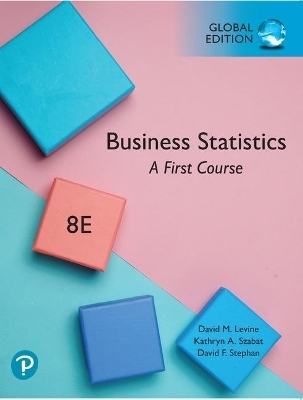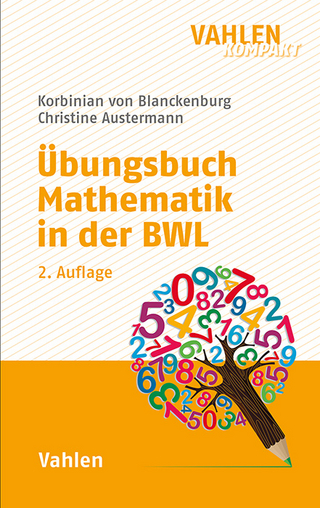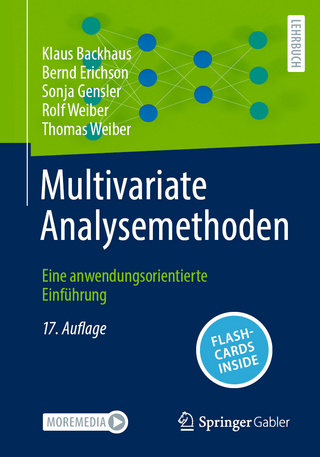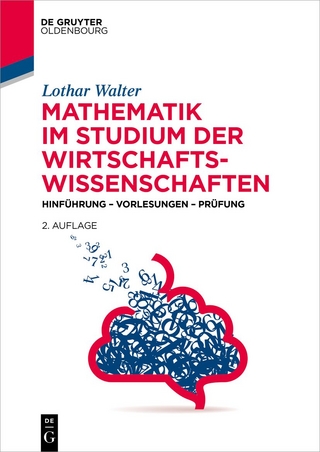
Business Statistics: A First Course, Global Edition
Pearson Education Limited (Verlag)
978-1-292-32036-6 (ISBN)
A focus on using statistical methods to analyse and interpret results to make data-informed business decisions
Statistics is essential for all business majors, and Business Statistics: A First Course helps students see the role statistics will play in their own careers by providing examples drawn from all functional areas of business. Guided by the principles set forth by major statistical and business science associations (ASA and DSI), plus the authors’ diverse experiences, the 8th Edition, Global Edition, continues to innovate and improve the way this course is taught to all students. With new examples, case scenarios, and problems, the text continues its tradition of focusing on the interpretation of results, evaluation of assumptions, and discussion of next steps that lead to data-informed decision making. The authors feel that this approach, rather than a focus on manual calculations, better serves students in their future careers. This brief offering, created to fit the needs of a one-semester course, is part of the established Berenson/Levine series.
David M. Levine is Professor Emeritus of Statistics and Computer Information Systems at Baruch College (City University of New York). He received BBA and MBA degrees in statistics from City College of New York and a PhD from New York University in industrial engineering and operations research. He is nationally recognised as a leading innovator in statistics education and is the co-author of over 15 books. He has published articles in various journals, including Psychometrika, The American Statistician, Communications in Statistics, Decision Sciences Journal of Innovative Education, Multivariate Behavioral Research, Journal of Systems Management, Quality Progress and The American Anthropologist. Advances in computing have always shaped David Stephan's professional life. As an undergraduate, he helped professors use statistics software that was considered advanced even though it could compute only several things discussed in Chapter 3, thereby gaining an early appreciation for the benefits of using software to solve problems (and perhaps positively influencing his grades). A nearly advocate of using computers to support instruction, he developed a prototype of a mainframe-based system that anticipated features found today in Pearson's MathXL and served as special assistant for computing to the Dean and Provost at Baruch College. In his many years teaching at Baruch, Stephan implemented the first computer-based classroom, helped redevelop the CIS curriculum, and, as part of a FIPSE project team, designed and implemented a multimedia learning environment. He was also nominated for teaching honors. Stephan has presented at SEDSI and DSI DASI mini-conferences, sometimes with his coauthors. Stephan earned a B.A. from Franklin & Marshall College and an M.S. from Baruch College, CUNY, and completed the instructional technology graduate program at Teachers College, Columbia University. As Associate Professor of Business Systems and Analytics at La Salle University, Kathryn Szabat has transformed several business school majors into one interdisciplinary major that better supports careers in new and emerging disciplines of data analysis including analytics. Szabat strives to inspire, stimulate, challenge, and motivate students through innovation and curricular enhancements and shares her coauthors' commitment to teaching excellence and the continual improvement of statistics presentations. Beyond the classroom she has provided statistical advice to numerous business, nonbusiness, and academic communities, with particular interest in the areas of education, medicine, and non-profit capacity building. Her research activities have led to journal publications, chapters in scholarly books, and conference presentations. Szabat is a member of the American Statistical Association (ASA), DSI, Institute for Operation Research and Management Sciences (INFORMS), and DSI DASI. She received a B.S. from SUNY-Albany, an M.S. in statistics from the Wharton School of the University of Pennsylvania, and a Ph.D. in statistics, with a cognate in operations research, from the Wharton School of the University of Pennsylvania.
First Things First
1. Defining and Collecting Data
2. Organizing and Visualizing Variables
3. Numerical Descriptive Measures
4. Basic Probability
5. Discrete Probability Distributions
6. The Normal Distribution
7. Sampling Distributions
8. Confidence Interval Estimation
9. Fundamentals of Hypothesis Testing: One-Sample Tests
10. Two-Sample Tests
11. Analysis of Variance
12. Chi-Square and Nonparametric Tests
13. Simple Linear Regression
14. Introduction to Multiple Regression
15. Multiple Regression Model Building
16. Time-Series Forecasting
17. Business Analytics
18. Getting Ready to Analyze Data in the Future
19. Statistical Applications in Quality Management (online)
20. Decision Making (online)
Self-Test Solutions and Answers to Selected Even-Numbered Problems
| Erscheinungsdatum | 24.12.2019 |
|---|---|
| Verlagsort | Harlow |
| Sprache | englisch |
| Maße | 213 x 274 mm |
| Gewicht | 1260 g |
| Themenwelt | Mathematik / Informatik ► Mathematik ► Finanz- / Wirtschaftsmathematik |
| Wirtschaft ► Volkswirtschaftslehre ► Ökonometrie | |
| ISBN-10 | 1-292-32036-2 / 1292320362 |
| ISBN-13 | 978-1-292-32036-6 / 9781292320366 |
| Zustand | Neuware |
| Haben Sie eine Frage zum Produkt? |
aus dem Bereich


